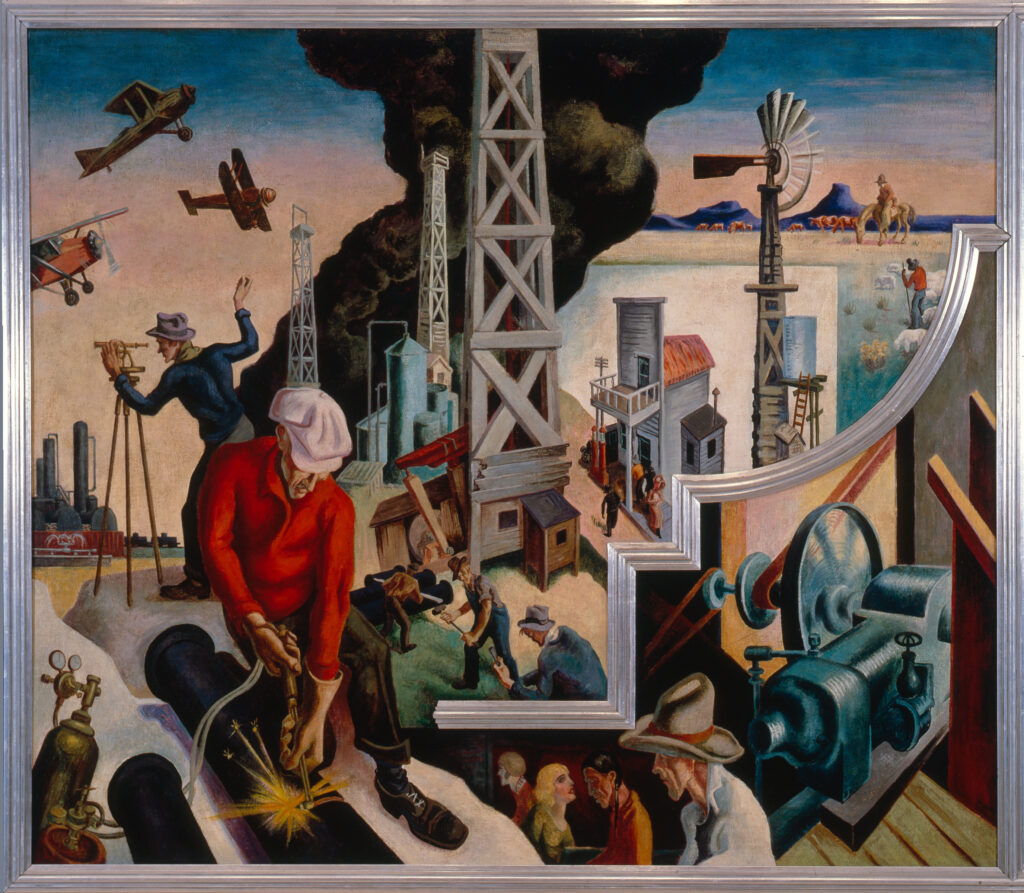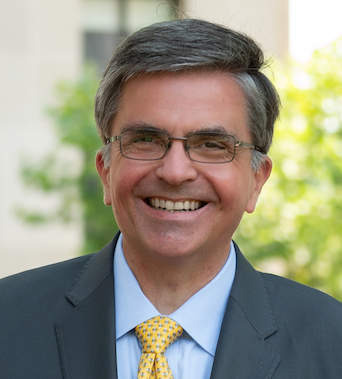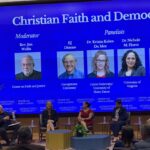Can we be hopeful about America? Many people obviously are not. Our nation’s problems are legion. We are wealthier and more privileged than any people who ever walked the earth yet plagued by divisions and misgivings.
There has been from the beginning an American tendency to think that our experiment in self-government always is tenuous. For 200 years there has been the likely apocryphal story of Benjamin Franklin’s response to an onlooker outside Constitution Hall curious about America’s new government: “A republic, if you can keep it.” Franklin likely never actually said this. But many of the Founders were within a generation concerned that their project might not endure. There were divisions and upheavals from the start.
John Adams famously wrote, “Our constitution was made only for a moral and religious people.” But no people who ever lived have been consistently moral or religious. They certainly were not in Adams’s day. And Adams himself fell short of Christian orthodoxy. The truly devout are a minority in every society. And even the truly devout rarely fully exemplify the morality their faith extols.
Beside the unevenness of religious devotion and virtue, America from the start has also likened itself to classical civilizations that rose and fell, especially the Greek and Roman republics. Discipline and public spirit degenerated into decadence and tyranny or anarchy for the early republics, and that threat always hangs over America. From this perspective, America must always be on guard. The implication is that the nation is constantly skating on very thin ice. One or two wrong moves and there’s collapse into the freezing water, from which there is no recovery.
This sense of America always standing on the precipice of potential disaster partly, maybe mostly, dates to the Puritans. We are under constant divine judgement. As King Belshazzar was warned by Daniel before the proud monarch was killed, “Thou art weighed in the balances, and art found wanting.” Or as Jonathan Edwards warned in his most famous sermon, sinners are like spiders that God dangles over a fire. We are always on the verge of dropping into the inferno.
This perspective of impending judgement and disaster followed by national implosion is somewhat unique to America. Russians, Chinese, Egyptians, and French do not typically fret about the possibility of their nations ceasing to exist. But of course, their nations are not experiments in self-government, defined by principles, and implicitly in covenant with God or at least abstract universal justice.
The American anxiety about self-destruction is long standing and egotistical. It minimizes the accomplishments of the past and presumes that we in our time have extraordinary power to nullify what previous generations across centuries constructed. The habits and traditions of a nation are neither suddenly created nor easily extinguished. Both projects typically entail multiple generations. Or as economist Adam Smith famously replied to a correspondent predicting disaster for Britain because of American success in the Revolution: “Be assured, my young friend, that there is a great deal of ruin in a nation.” In other words, great nations can survive many calamities.
One spiritual way of understanding what sustains a nation even through its adversities is the Catholic Church’s “treasury of merit” of “treasury of the saints.” The Catholic Catechism explains:
In the communion of saints, “a perennial link of charity exists between the faithful who have already reached their heavenly home, those who are expiating their sins in purgatory and those who are still pilgrims on earth. Between them there is, too, an abundant exchange of all good things.” In this wonderful exchange, the holiness of one profits others, well beyond the harm that the sin of one could cause others.
And:
We also call these spiritual goods of the communion of saints the Church’s treasury, which is “not the sum total of the material goods which have accumulated during the course of the centuries. On the contrary the ‘treasury of the Church’ is the infinite value, which can never be exhausted, which Christ’s merits have before God.
And:
“This treasury includes as well the prayers and good works of the Blessed Virgin Mary. They are truly immense, unfathomable, and even pristine in their value before God. In the treasury, too, are the prayers and good works of all the saints, all those who have followed in the footsteps of Christ the Lord and by his grace have made their lives holy and carried out the mission in the unity of the Mystical Body.”
This church’s storehouse of grace is infinite and inexhaustible. No single Christian or group of contemporary Christians must fret about surviving sheerly on their own merit and ingenuity. They are always part of the communion of saints, sustained by divine grace, enduring forever.
Of course, neither America nor any nation can be likened to a church. Earthly nations, unlike the church, don’t endure eternally. Nor is any nation the exclusive expression of God’s mercy, though all nations are recipients of God’s mercy and depend on His grace, whether they realize it or not.
But this Catholic treasury of merit offers a model for reminding us that we never stand, as a national people, or as individuals, relying completely on our deeds. Our nation is a deposit of many deeds by many people across vast swaths of time. We continue to benefit and receive earthly grace from their accomplishments and sacrifices.
We are free and prosperous today thanks to the labors of the first English settlers in Virginia who came for adventure and better lives, the Pilgrims, Puritans and Quakers, who came for religious freedom, from the enslaved Africans, who built the great plantations and patiently waited and contended for their own liberty, for the Scots-Irish who populated the early back country, for Germans and others who fled European war and turmoil, for Jews who escaped pogroms, for Poles, Italians and others who escaped great poverty, who Chinese immigrants and others who built the railroads and settled the West Coast, for Latin Americans who tilled the orchards of the southwest, for countless others, including the original indigenous peoples, who melded into the American experiment, often at great cost, yet contributed mightily to our civilization. They hacked farms from wilderness, built highways, cities, and industries, fought the wars, built the court houses, and capitals, wrote the laws. They founded the churches, schools, colleges, and universities, often from nothing. They nearly all were inspired by the promise of freedom and law, ratified in America’s founding charters. They strove to enact democracy. Many of them lived short lives, full of suffering. Yet they persevered across four hundred years. They reaped the fruits of an older civilization, in Britain, and the Netherlands, which sought to limit arbitrary power, protect the rights of individuals, allow for freedom of conscience, and defend private property. It’s a long tradition that continues to unfold, each generation subtracting from and contributing towards it.
We in our own time can subtract from what they built. But we cannot easily destroy it. What they built was set upon firm ground, watered by blood, hope, sweat, and prayers. We glow and live comparatively easy lives, often amid more complaints than thanks, because they dreamt of a country that could stand apart as a beacon to the world. In our better moments we are expanding what they began and sustained.
The deposit of liberty and abundance bequeathed to us by previous generations of Americans is not, unlike divine grace, inexhaustible. But it is immense and unfathomable. We should not fret that we will lose it. Such obsessive worries betray the bequest. Instead, we should rejoice in its light and protection. And we should ponder how we can add to it with our own sacrifices, so four hundred years from now, Americans will look up from their own problems and gratefully reflect on our own contributions to their comforts and happiness.






Comment by Different Steve on July 27, 2024 at 10:35 am
Hundreds of United Methodist churches in the Rio Texas Annual Conference lost property insurance last November, leaving officials scrambling.
Over six months later, some churches found new insurance at higher costs, while others remain uninsured, said Kevin Reed, conference board of trustees president.
Reed noted the conference had about a month’s notice before their property insurance was canceled, which wasn’t enough time to secure new coverage, leaving local churches to fend for themselves.
“We have not found a good solution. It continues to be a significant problem for our churches,” he said.
The report says that United Methodist churches in Iowa have also lost insurance following severe weather, according to the Iowa Annual Conference.
Rev. Ron Carlson, the conference treasurer, said both small rural and larger churches were affected. The conference urged churches to proactively check their insurance instead of waiting for renewal offers.
The UMC’s Book of Discipline requires full replacement and liability insurance for church buildings, which Carlson noted is not feasible for some. The conference is working to address what happens to these uninsured churches.
https://www.zerohedge.com/markets/church-insurance-rates-are-skyrocketing
Comment by David on July 28, 2024 at 8:38 am
“We are wealthier and more privileged than any people who ever walked the earth…” For another view, watch this:
https://www.nytimes.com/2019/07/01/opinion/america-great.html?unlocked_article_code=1.-k0.sHra.PszSbi2xk6fk&smid=url-share
Comment by Salvatore Anthony Luiso on August 2, 2024 at 7:24 pm
Regarding “The implication is that the nation is constantly skating on very thin ice. One or two wrong moves and there’s collapse into the freezing water, from which there is no recovery.”: That’s an exaggeration.
Regarding “We in our own time can subtract from what they built. But we cannot easily destroy it.”: The author appears not to know that a great deal of it is already gone.
Regarding “We should not fret that we will lose it. Such obsessive worries betray the bequest.”: The “deposit of liberty and abundance bequeathed to us by previous generations” was preserved by people who vigilantly conserved and protected it, not by people who presumed it would survive without care.
Regarding “One spiritual way of understanding what sustains a nation even through its adversities is the Catholic Church’s ‘treasury of merit’ of ‘treasury of the saints.'”: You could also cite what the Bible says about how God dealt with the ancient Israelites, as there were times when He was merciful toward them for the sake of Abraham, David, and His own name.
But He didn’t always do that. And we shouldn’t presume that He will do likewise with us.
I think that if we Americans examine and assess the state of our society with honesty and sober-mindedness, we will see much that is alarming–especially if we compare it with past generations. We should *not* be presumptuous toward our ancestors and especially not toward God.
Comment by Tom Thornton on August 4, 2024 at 5:47 pm
Certainly contemporary America benefits from the traditions and the memories of many aspects of our past, but to liken this to the Roman concept of Treasury of merit is greatly misguided and betrays a a misunderstanding of the concept as used by the Roman Catholic Church.